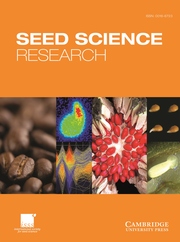Article contents
Endo-β-mannanase and β-mannosidase activities in rice grains during and following germination, and the influence of gibberellin and abscisic acid
Published online by Cambridge University Press: 22 February 2007
Abstract
Grains of indica rice (Oryza sativa cv. Peiza 67) exhibit an increase in endo-β-mannanase activity, mostly after the completion of germination. According to tissue blots, the initial increase occurs in association with the embryo, and possibly the scutellum, although the largest sustained increase in activity is in the peripheral regions of the endosperm. The aleurone layer, being the only living region of the endosperm, is presumably the site of synthesis and secretion of the enzyme into the non-living, starch-laden region. β-Mannosidase activity is low throughout germination and subsequent seedling growth, particularly in the endosperm regions. Its activity profile does not mimic that of endo-β-mannanase. In the intact grain, gibberellin (GA) causes a relatively small increase in endo-β-mannanase activity, while abscisic acid (ABA) causes a large decrease; this inhibition is overcome to a considerable extent when GA is supplied along with ABA. β-Mannosidase activity is little affected by either GA or ABA. Embryoless half-grains imbibed in water exhibit only a small increase in endo-β-mannanase activity with time of imbibition, showing the necessity for a stimulus from the embryo for this to occur. Incubating half-grains in the presence of GA results in a large increase in enzyme activity; ABA reduces the amount of activity compared to the water controls. GA is capable of reversing the inhibitory effect of ABA with respect to endo-β-mannanase activity. As in the intact grains, β-mannosidase activity in the half-grains is unaffected by either GA or ABA. It is concluded that the major site for the production of endo-β-mannanase activity is the aleurone layer, and this event is influenced by the presence of the embryo; in the absence of the latter, the increase in enzyme activity is stimulated by GA. β-Mannosidase activity is low throughout germination and post-germination, it is not influenced by GA and ABA, and thus its activity is not regulated in a coordinated manner with that of endo-β-mannanase.
Information
- Type
- Research Article
- Information
- Copyright
- Copyright © Cambridge University Press 2005
References
- 20
- Cited by

